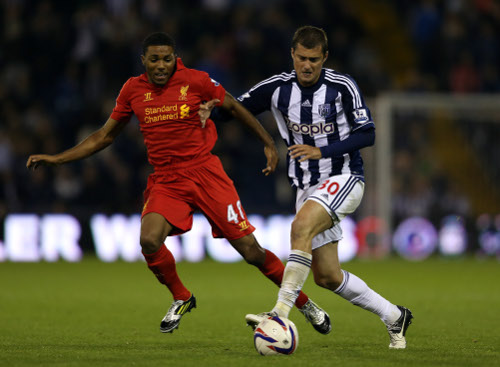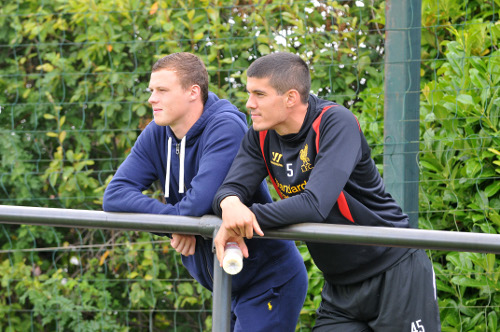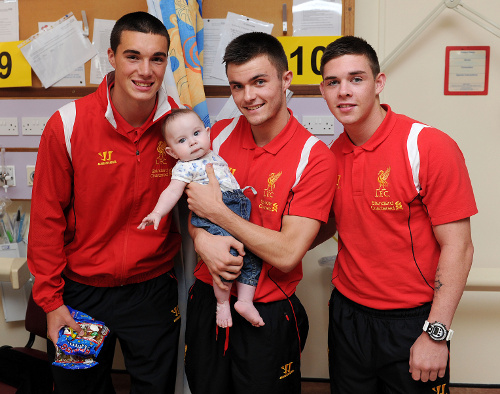- Home /
- News /
- Latest News /
- 'The day after debut he was doing maths'
In the first of what will become a weekly feature keeping fans up to date with goings on at the club's Academy, head of education and welfare Phil Roscoe explains how they go about ensuring players stay grounded throughout their formative football years.
Roscoe's pastoral role (he is also assistant academy manager) means he oversees the academic progression of the club's 198 young players from the Elite Development Squad, U18s and U9-U16 schoolboy programme.
It is a varied and vital role, as he explains in his first column for Liverpoolfc.com...
It's been a very good week at the Academy as on Tuesday we qualified for the last 16 of the NextGen Series. The lads did fantastically well - Inter were a tough test but with the great preparation for the game the lads played some very good football.
Frank, Rodolfo and I went down to the changing rooms after the game to see the lads. Alex Inglethorpe spoke to them and he was clearly delighted but, as we are developing players, he also spoke about the areas they need to improve and told them where they needed to work in preparation for the next game.
Okay, we won the game, but winning one game is not going to get a player into the first team. It's about keeping a player grounded and realistic about where he is on his football journey.
One way to keep a player grounded is for him to understand reality very quickly after such a high like beating Inter.
And one example of how we do this at the Academy is Jerome Sinclair's debut for the first team in the Capital One Cup at West Brom. In the evening Jerome became the youngest player in Liverpool's history. The next morning he was back in school doing maths.

That's how it should be. That's the norm and it's the same with the boys who played in the NextGen team on Tuesday night. They played the game, came back in on Thursday and the focus was on the next training session.
The common perception of education in football is just about players sat in a classroom taking part in BTEC, A-levels or GCSEs but the Academy education is about everything they do - it's so different to a school education.
From the football to the boys getting qualifications that will enable them to progress in a career, should things not work out at Liverpool. It's about setting them up if they do succeed and want to do something after their career. It's about how to manage their finances, teaching them how to cook and how to be better people really.
And that education occurs all the time. For us it's about developing each individual. Every boy is different and they won't all do the same educational program while they are with us. Their learning is fitted around what they need.
Some players may come over from a different country and need a little more help in understanding the language; they may need help learning where to go to shop and stuff like that. A local boy may need a little more support around managing finances because maybe he lives at home and doesn't know where to save his money for instance.
As a player gets older and becomes a professional, the finances become greater and the temptation becomes greater. I work with Clive Cook (education and welfare officer) and we sit down and look at different and new things that we think will benefit the players.

For example, Clive thought it would be a fantastic idea to have the boys go to the homeless centre and support the sisters serving food to the homeless, which I thought was a great idea. Not only as an experience for the players but also as an experience for me. It's something that I had never done. I went along and helped. And do you know what? I just stood there and thought, 'This is fantastic'.
Players must realise that they are in privileged positions in society. That's why we have a link with Alder Hey hospital. We go there regularly because it's not only fantastic to give something back to the children there, who can sometimes be extremely ill. But also to make the players realise that the reality is - any problems that they may have themselves are nothing compared to the daily problems that the children at Alder Hey have.
But we develop these attitudes over time. We don't just pick up a group of players and send them out to these events hoping what they see and learn instantly turns them into a rounded person, who appreciates everything that is done for them.
From a very young age, we try to ingrain these attitudes on our players. And so as they develop over a period of years, it becomes the natural thing for them.

We expect high standards here - in the appearance of the player, how he comes across, how he represents Liverpool and how he is able to represent himself and his family. That is not done without rules and without high standards set by staff and other payers.
On the field there is a clear Liverpool philosophy taking place from first team down to the Academy. Off the field, we are working hard to create a philosophy of how a Liverpool person should be.
But players also have to feel comfortable enough to be able to come and speak to us about any issues, whether it is football-related or off-the-field problems.
As you become experienced in working with players of all ages, you start to find your own individual way for how you are able to connect with players and how they can relate to you.
I've always felt that off the field, away from the training ground, a relaxed environment, where a player can enjoy himself, express opinion and feel free to speak to you about any subject is definitely the best way to get the best from that player.
Stay tuned to Liverpoolfc.com over the next week for the second instalment of our Academy columns.
Tagged: academy , phil roscoe , roscoe
- 00:01 Liverpool FC Legends v Australian Legends: The Match
- 02:00 Kolo Toure: Sixty Minutes With...
- 03:00 Liverpool U21 v Reading: The Match
- 05:00 The Best of #LFCWORLD 2015-16 Vol.2
- 06:00 Goal Rush: Season So Far
- 06:30 #LFCWORLD - EP27
- 07:00 Press Box
- 08:00 Thursday Night Show
- 09:00 #LFCWORLD - EP27
- 09:30 Kop Kids
- 10:00 Goals Goals Goals 5
- 12:00 The Premier League Preview Show
- 13:00 Thursday Night Show
- 14:00 Matchday Live


























